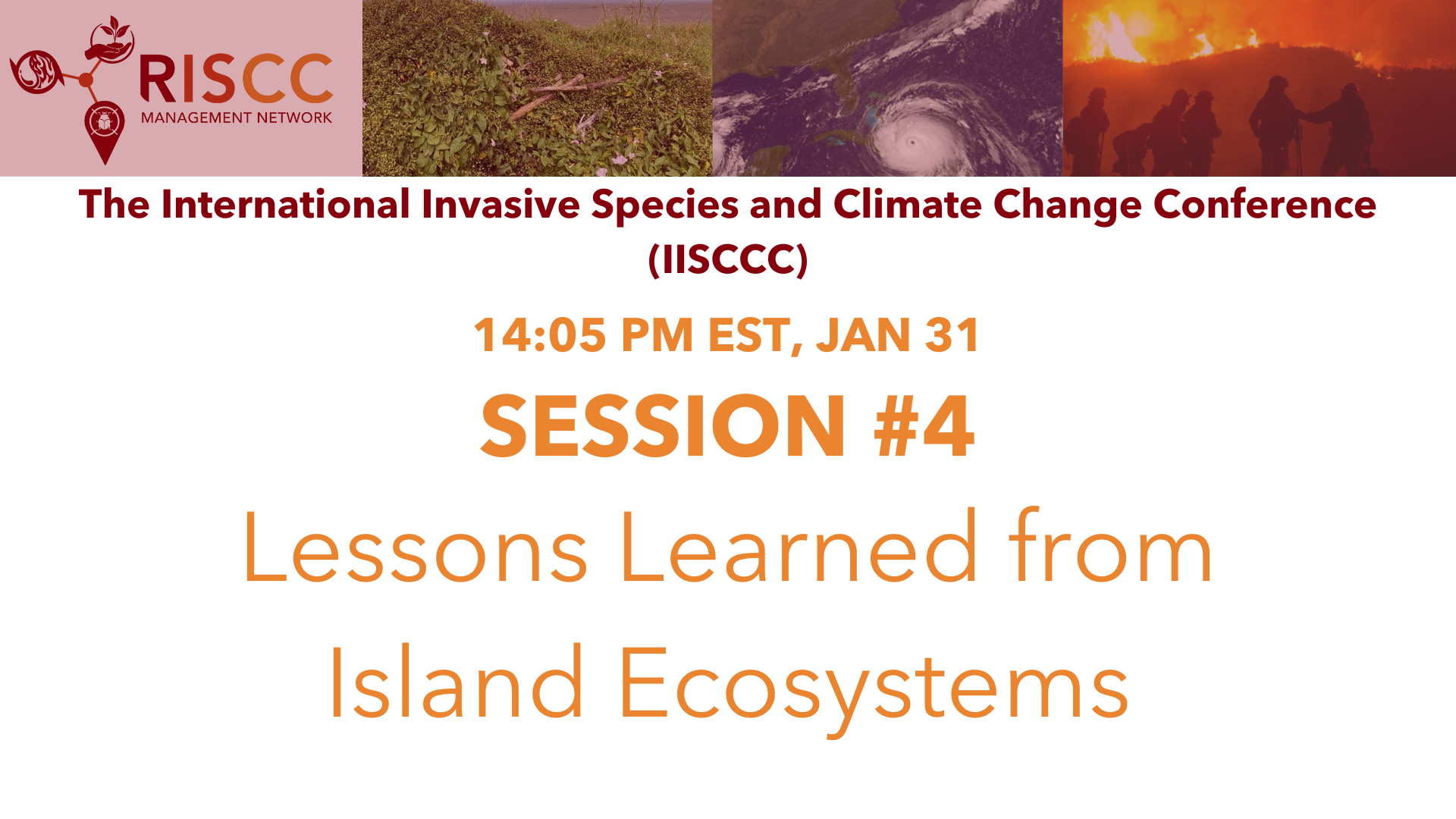THE INAUGURAL
INVASIVE SPECIES AND CLIMATE CHANGE CONFERENCE
Jan 30-31st, 2024
The Inaugural International Invasive Species and Climate Change Conference was organized by the Regional Invasive Species and Climate Change (RISCC) Network and hosted by the North American Invasive Species Management Association (NAISMA). The event was a smashing success with nearly 1300 attendees from >20 countries and 6 continents (or maybe all 7!?!).
The IISCCC included a keynote, 2 plenary talks, a panel discussion, audience participation, and 5 sessions including 25 talks (most available as recordings below) on a variety of topics related to the intersection of climate change and invasive species. It was held remotely and designed to create a space to share research and management practices, expand networks, and promote translational experiences.
See you next year!
Conference Agenda
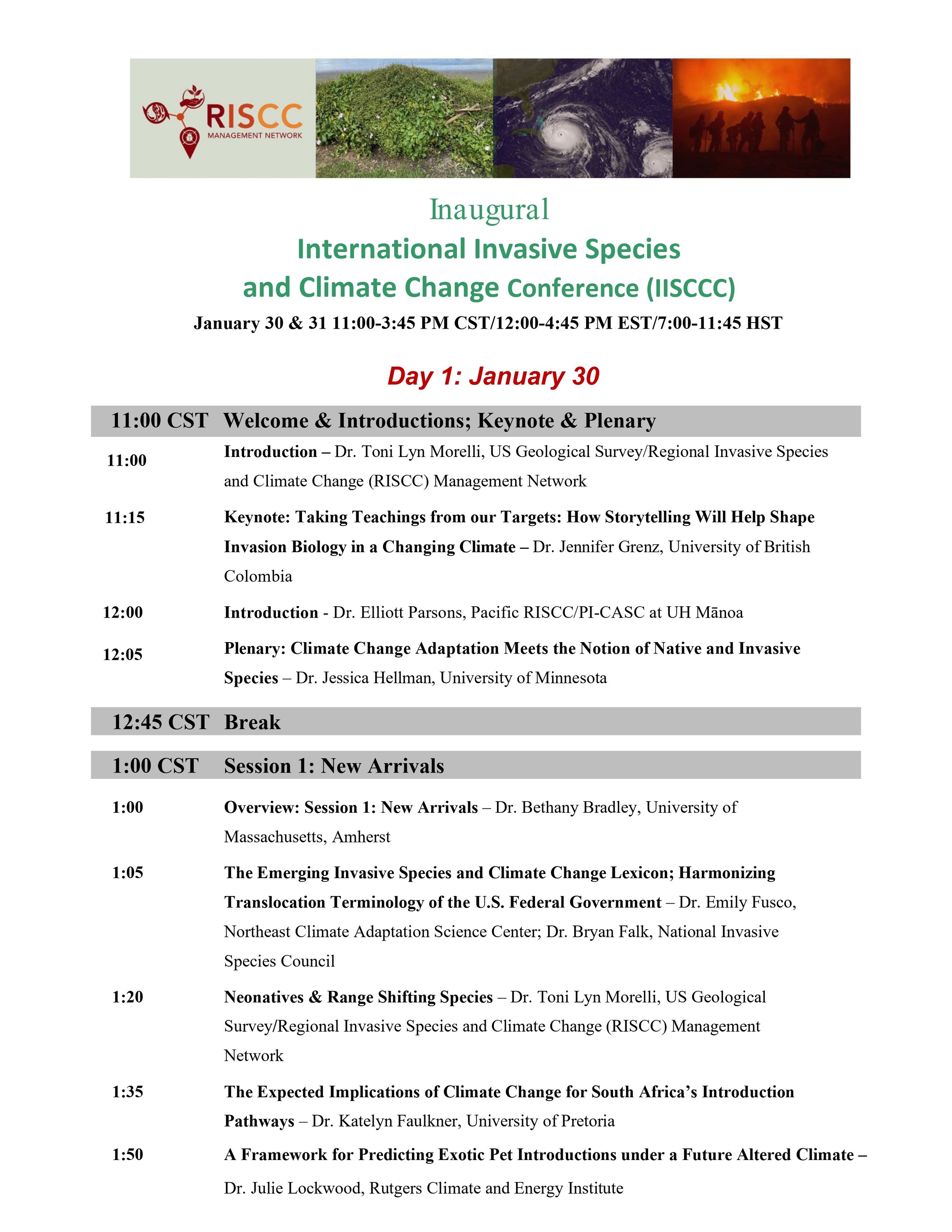
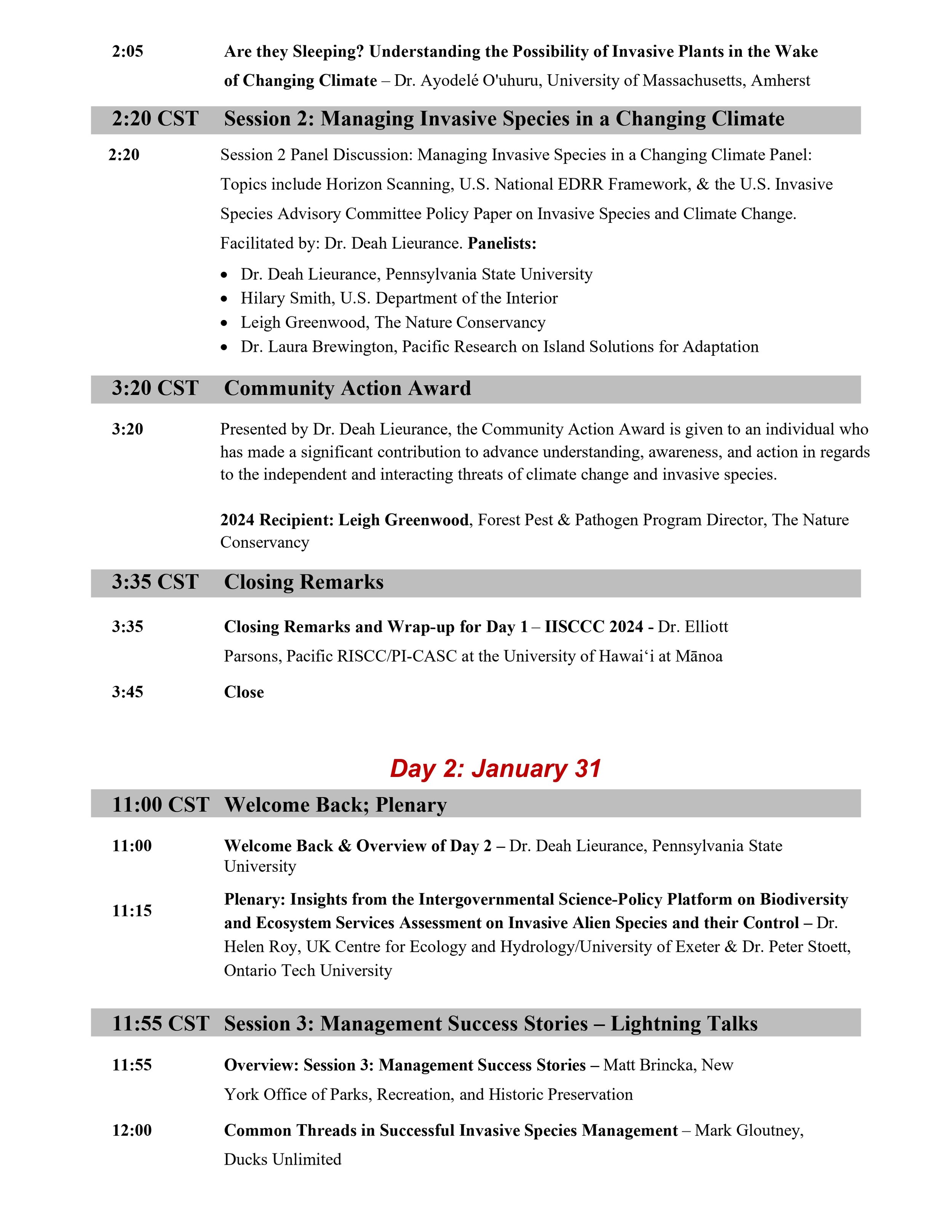
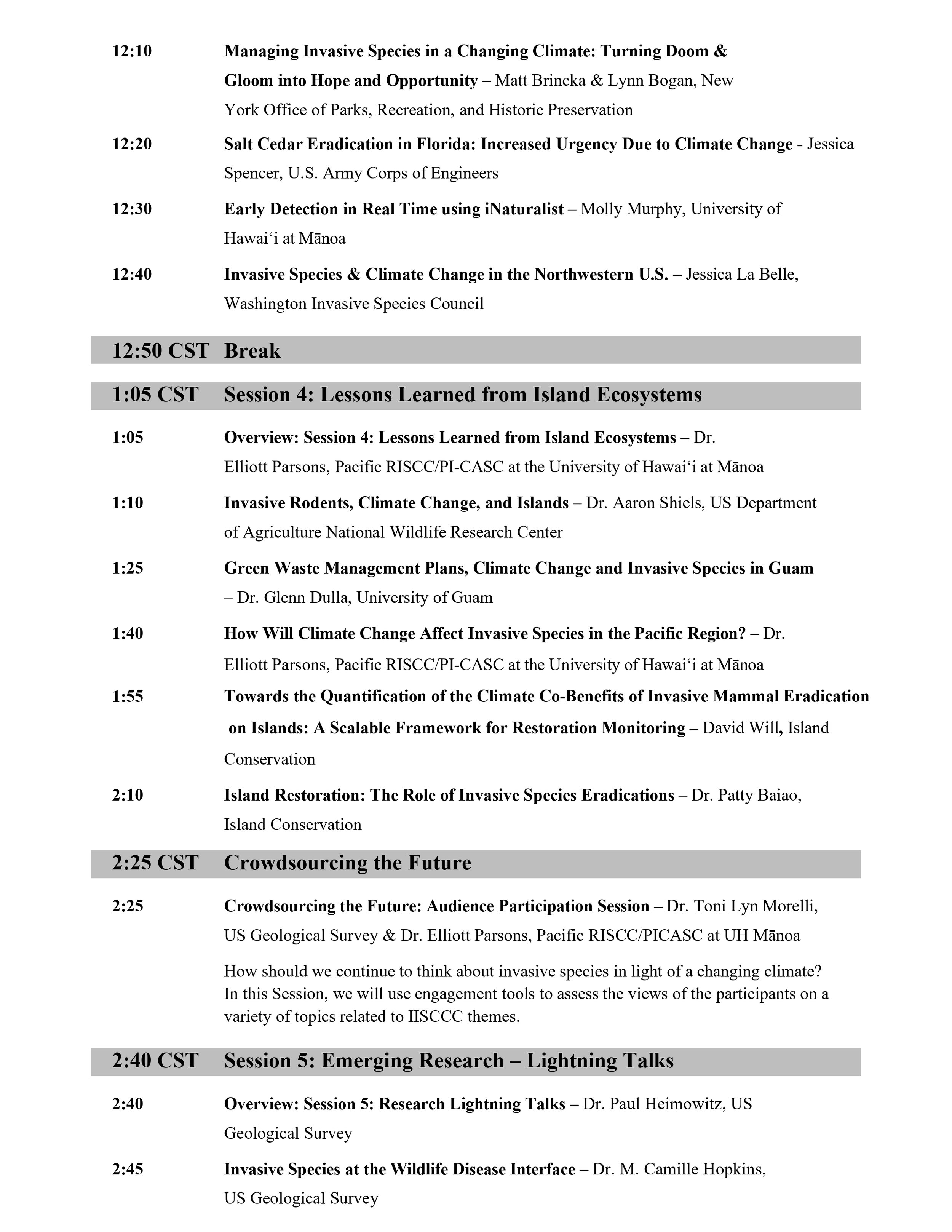
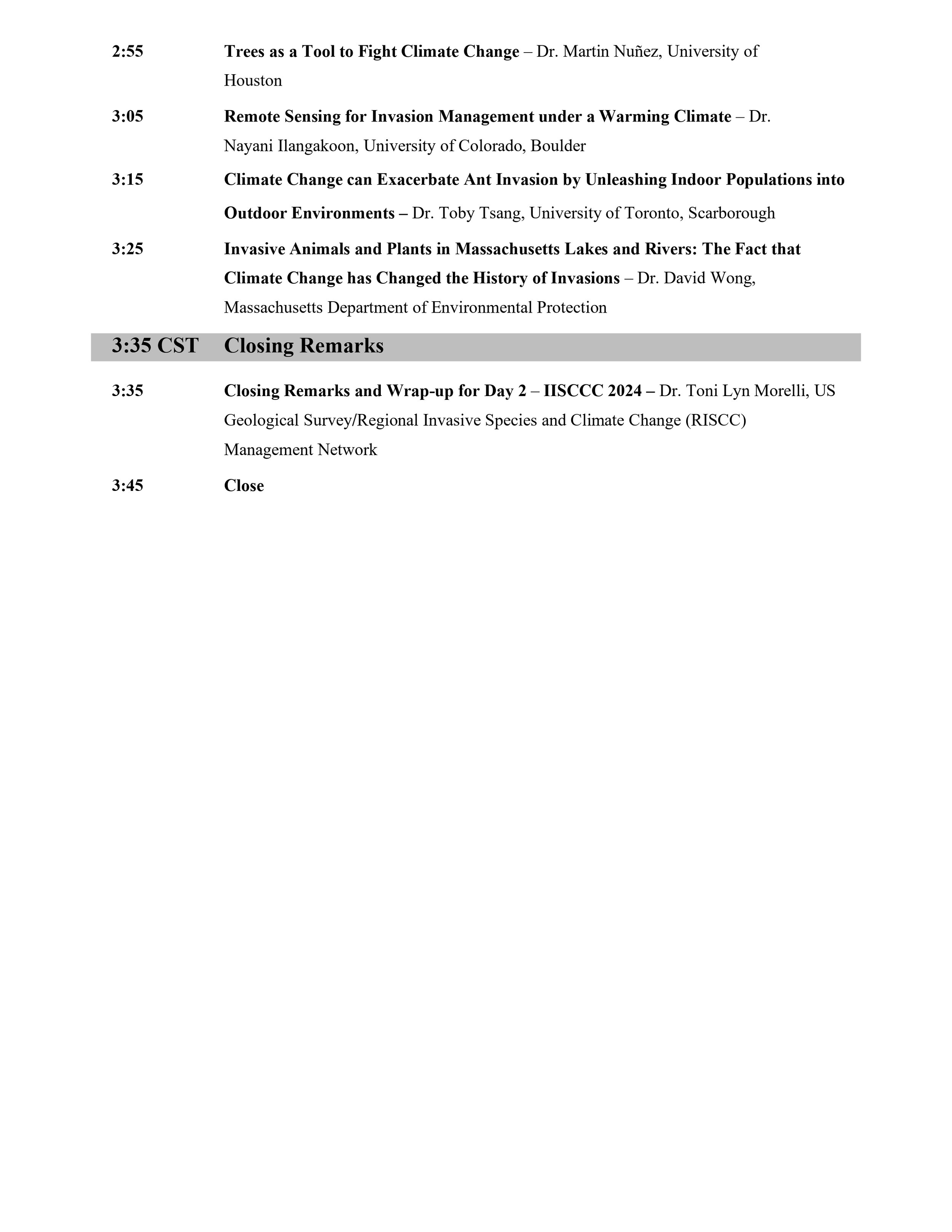
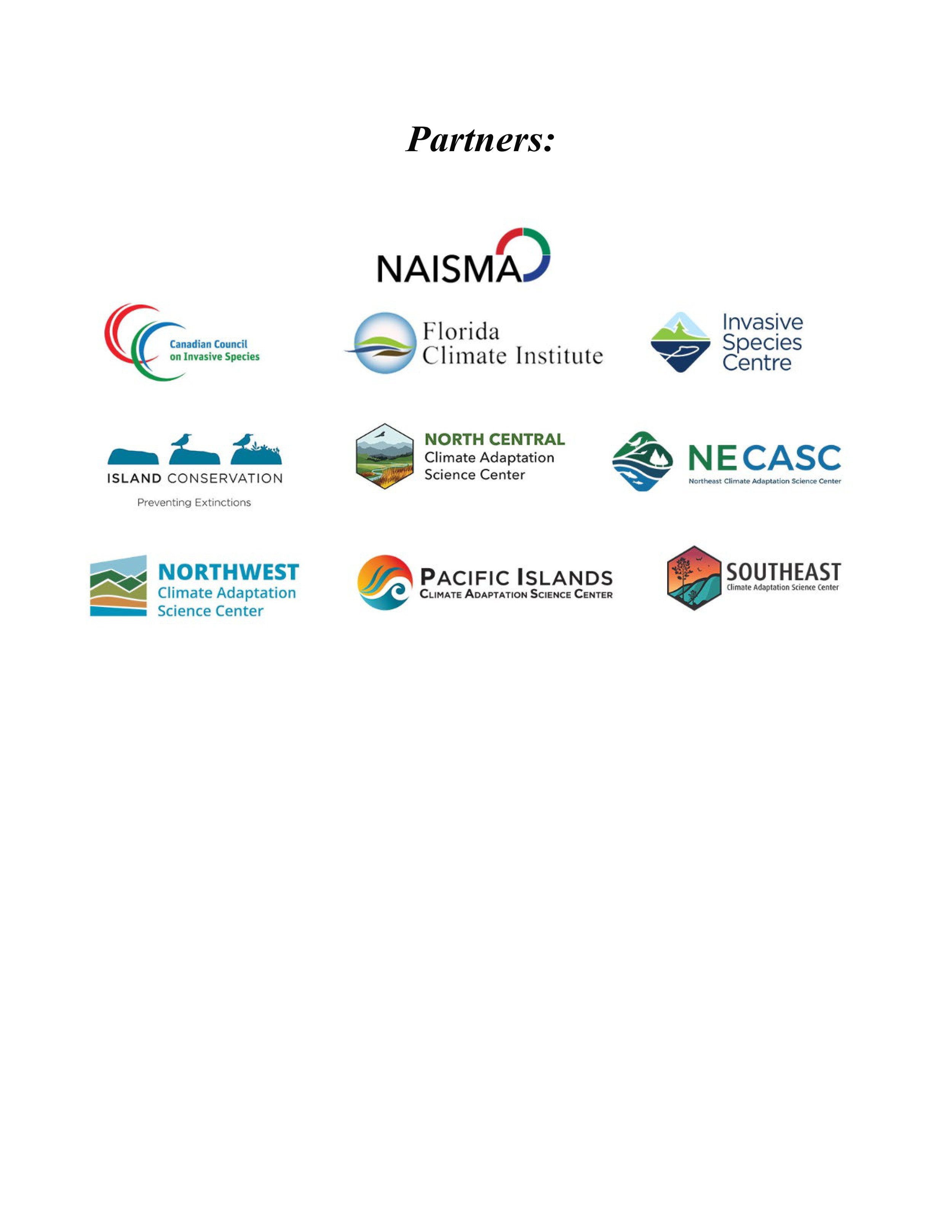
Keynote Speaker
Jennifer Grenz (University of British Colombia)
Session begins at 8:30
Taking Teachings from our Targets: how storytelling will help shape invasion biology in a changing climate
Jennifer Grenz is an Assistant Professor in the Department of Forest Resources Management at the University of British Columbia. She has a BSc in Agroecology and a PhD in Integrated Studies in Land and Food Systems (both from UBC). Jennifer’s research focuses on applying an Indigenous worldview (she is Nlaka’pamux of mixed ancestry) to invasion biology and ecology and challenges us to think differently about our role in ecosystems management as we face a rapidly changing climate. She is passionate about bridging the practitioner-researcher divide as she worked for nearly two decades providing consulting services and on-the-ground management of invasive species for all levels of government prior to her academic appointment. Her lab, The Indigenous Ecology Lab, is currently working on understanding the impacts of invasive plants on soil microbial ecology and the role of these impacts on post eradication restoration activities.
Plenary
Jessica Hellmann (University of Minnesota)
Session begins at 49:18
Climate change adaptation meets the notion of native and invasive species
Dr. Jessica Hellmann is Director and Ecolab Chair at the Institute on the Environment and Distinguished McKnight University Professor of ecology at the University of Minnesota. She studies the impacts of climate change on natural systems and methods for adapting to climate change. She leads the Midwest Climate Adaptation Science Center for the US Geological Survey, and in 2018, she co-founded Geofinancial Analytics, a private venture that benchmarks methane emissions in the oil and gas sector. She serves several non-profits as a board member, including the Science Museum of Minnesota, COMPASS (an NGO advancing societal engagement of scientists) and the National Audubon Society.
Session #1: New Arrivals
Session begins at 1:45:46
Moderated by Bethany Bradley (UMass Amherst), the presentation session featured the following speakers:
Emily Fusco (Northeast Climate Adaptation Science Center) & Bryan Falk (National Invasive Species Council), "The Emerging Invasive Species and Climate Change Lexicon; Harmonizing Translocation Terminology of the US Federal Government"
Toni Lyn Morelli (US Geological Survey - Northeast Climate Adaptation Science Center), "Climate-Driven Range Shifts of Invasive Species and Nuisance Neonatives"
Katelyn Faulkner (South African National Biodiversity Institute & University of Pretoria), "Monitoring Marine Invasive Species in New England"
Julie Lockwood (Rutgers Climate and Energy Institute), “A Framework for Predicting Exotic Pet Introductions under a Future Altered Climate”
Ayodelé O'uhuru (UMass Amherst & US Fish and Wildlife Service), “Are they Sleeping? Understanding the Possibility of Invasive Plants in the Wake of Changing Climate”
Session #2 Panel: Managing Invasive Species in a Changing Climate
Session begins at 2:12:31
Moderated by Deah Lieurance (The Pennsylvania State University), the panel featured the following speakers:
Leigh Greenwood (The Nature Conservancy)
Deah Lieurance (The Pennsylvania State University)
Hilary Smith (US Department of the Interior)
Laura Brewington (ASU Global Institute for Sustainability and Innovation)
COMMUNITY ACTION AWARD
Session begins at 3:00:15
Plenary
Helen Roy (UK Centre for Ecology and Hydrology & University of Exeter) and Peter Stoett (Ontario Tech University)
Session begins at 3:44
Insights from the Intergovernmental Science-Policy Platform on Biodiversity and Ecosystem Services Assessment on Invasive Alien Species and their control
Helen Roy
Helen is an Ecologist at the United Kingdom Centre for Ecology and Hydrology (UKCEH) and Professor in Ecology at the University of Exeter. Helen co-leads a large research group within the Biodiversity Science Area. Within the Biological Records Centre (part of UKCEH), Helen leads programs to develop zoological monitoring and research working in collaboration with the volunteer wildlife recording community. She is leading global collaborations to deliver high impact research to understand and predict the effects of biological invasions (and other drivers of global environmental change) on biodiversity and ecosystem function using large-scale and long-term species distribution and abundance datasets.
Since 2008 Helen has led a Defra-funded project to compile information on invasive non-native species for Britain and is currently leading a Darwin Plus project to compile information on invasive non-native species for all the UK Overseas Territories. Prevention, early detection and rapid response are critical to the management of invasive non-native species and the collaborative approaches Helen has developed for horizon scanning to inform prevention have achieved international recognition and application. Her research on biological invasions has gained her international recognition both through informing policy and advancing science including as co-chair of the IPBES Thematic Assessment on Invasive Alien Species and their Control.
Peter Stoett
Dr. Peter Stoett’s main areas of research expertise include international relations and law, global environmental politics, and human rights; he is especially interested in critical perspectives on the many nuanced intersections between these themes. Current research focuses on biodiversity conservation policy, transnational environmental crime, marine pollution prevention, climate justice, and Canadian-American environmental relations. He has also worked extensively on genocide and war crimes prevention and punishment.
Prior to joining Ontario Tech University, Dr. Stoett was Director of the Loyola Sustainability Research Centre, and Chair of the Department of Political Science, at Concordia University in Montreal, Québec. Currently, he is co-chairing the first global assessment on invasive alien species conducted by the Intergovernmental Science-Policy Platform on Biodiversity and Ecosystem Services (IPBES). He has also worked with the United Nations Environmental Program (UNEP) as a Coordinating Lead Author on the sixth flagship Global Environmental Outlook report, and was a contributing expert on the 2020 IPBES Workshop Report on Biodiversity and Pandemics.
Session #3: Management Success Stories - Lightning Talks
Session begins at 46:49
Moderated by Matt Brincka (New York State Parks), the presentation session featured the following speakers:
Stuart Slattery (Institute for Wetland and Waterfowl Research) presenting on behalf of Mark Gloutney (Ducks Unlimited Canada), "Common Threads in Successful Invasive Species Management"
Matt Brincka (New York State Parks) and Lynn Bogan (New York State Parks), "Managing Invasive Species in a Changing Climate: Turning Doom & Gloom into Hope & Opportunity"
Jessica Spencer (US Army Corps of Engineers), "Salt Cedar Eradication in Florida: Increased Urgency Due to Climate Change"
Molly Murphy (University of Hawaiʻi at Mānoa), “Early Detection in Real Time using iNaturalist ”
Jessica La Belle (Washington Invasive Species Council), “Banding Together to Create the Washington State Spotted Lanternfly Action Plan”
Session #4: Lessons Learned from Island Ecosystems
Session begins at 1:40:09
Moderated by Elliott Parsons (Pacific RISCC/Pacific Islands Climate Adaptation Science Center at UH Māno), the presentation session featured the following speakers:
Aaron Shiels (USDA National Wildlife Research Center), "Invasive Rodent Responses to Increased Hurricane Frequency"
Glenn Dulla (University of Guam), "Green Waste Management Plans, Climate Change and Invasive Species in Guam"
Elliott Parsons (Pacific RISCC/Pacific Islands Climate Adaptation Science Center at UH Māno), "How will Climate Change affect Invasive Species in the Pacific Region?"
David Will (Island Conservation), "Toward the Quantification of the Climate Co-benefits of Invasive Mammal Eradication on Islands: A Scalable Framework for Restoration Monitoring"
Patty Baiao (Island Conservation), "Island Restoration: The Role of Invasive Species Eradications”
Session #5: Research Lightning Talks
Session begins at 3:01:44
Moderated by Paul Heimowitz (United States Geological Survey), the presentation session featured the following speakers:
M. Camille Hopkins (United States Geological Survey), "Invasive Species at the Wildlife Disease Interface"
Martin Nuñez (University of Houston), "Trees as a Tool to Fight Climate Change"
Nayani Ilangakoon (University of Colorado Boulder), "Remote Sensing for Invasion Management under a Warming Climate"
Toby Tsang (University of Toronto Scarborough), "Climate Change can Exacerbate Ant Invasion by Unleashing Indoor Populations into Outdoor Environments"
David Wong (Massachusetts Department of Environmental Protection), "Invasive Animals and Plants in Massachusetts Lakes and Rivers: The Fact that Climate Change has Changed the History of Invasions”
PARTNERS
Conference Organized by
Giancarlo Ceja (University of Southern California / Northeast RISCC)
Deah Lieurance (The Pennsylvania State University / Northeast RISCC)
Toni Lyn Morelli (United States Geological Survey / Northeast Climate Adaptation Science Center / Northeast RISCC)
Elliott Parsons (Pacific RISCC / Pacific Islands Climate Adaptation Science Center at UH Mānoa)









